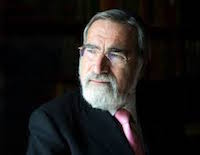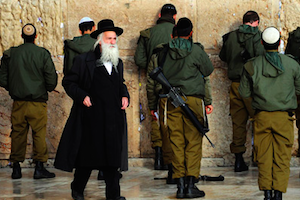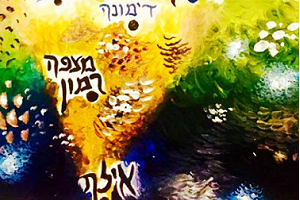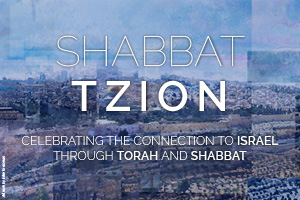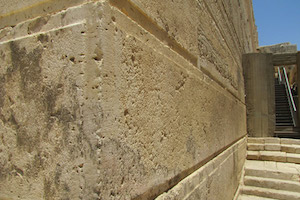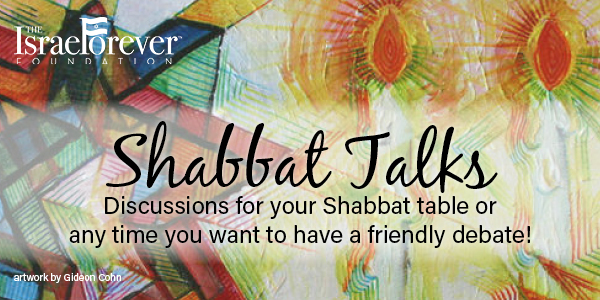The Civilization that Refuses to Die: Parashat Tzav
By Rabbi Lord Jonathan Sacks, Z"L
The name of the parasha Tzav (Lev. 6-8) is related to the word mitzva: it indicated an imperative, quickness or immediacy. As we continue in our redemption story, the commandments being bestowed unto Aaron by Moses about the laws of the burnt offering (the korban olah). The tabernacle sacrifices are repeated in detail from the perspective of the priests' duties. The order of sacrifices here-- evening burnt offerings, morning burnt offerings, peace offerings, and lighting the eternal light from the sacrificial altar-- reflects the progress of Israel and human history.
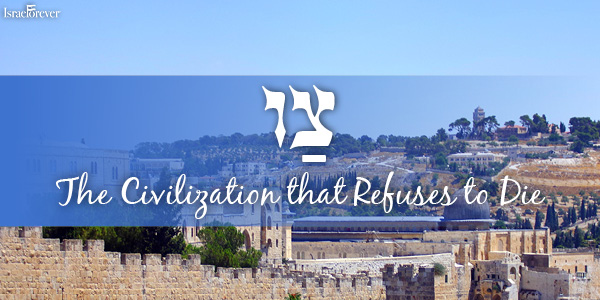
Like the fall of the Roman Empire, and the Khmer Empire of thirteenth century Cambodia, the collapse of whole civilizations occurred because problems became too many and complicated for the people of that time and place to solve. There was cognitive overload, and systems broke down.
It can happen to any civilisation. It may be happening to ours. The first sign of breakdown is gridlock. Instead of dealing with what everyone can see are major problems, people continue as usual and simply pass their problems on to the next generation. The second sign is a retreat into irrationality. Since people can no longer cope with the facts, they take refuge in religious consolations.
Archeologists have uncovered gruesome evidence of human sacrifice on a vast scale. Which makes the case of Jews and Judaism fascinating. They faced two centuries of crisis under Roman rule between Pompey’s conquest in 63 BCE and the collapse of the Bar Kochba rebellion in 135 CE. They were hopelessly factionalised. Long before the Great Rebellion against Rome and the destruction of the Second Temple, Jews were expecting some major cataclysm.
What is remarkable is that they did not focus obsessively on sacrifices, like the Mayans and the Khmer. Instead they focused on finding substitutes for sacrifice. One was gemilut chassadim, acts of kindness. Rabban Yochanan ben Zakkai comforted Rabbi Joshua, who wondered how Israel would atone for its sins without sacrifices, with the words, “My son we have another atonement as effective as this: acts of kindness, as it is written (Hosea 6:6), ‘I desire kindness and not sacrifice’” (Avot de Rabbi Natan 8).
Another was Torah study. The sages interpreted Malachi’s words (1:11), “In every place offerings are presented to My name,” to refer to scholars who study the laws of sacrifice. (Menachot 100a). “One who recites the order of sacrifices is as if he had brought them” (Taanit 27b).
Another was prayer. Hosea said, “Take words with you and return to the Lord . . . We will offer our lips as sacrifices of bulls” (Hos. 14:2-3), implying that words could take the place of sacrifice. “He who prays in the house of prayer is as if he brought a pure oblation.” (Yerushalmi, Perek 5 Halacha 1).
Yet another was teshuvah. The Psalm (51:19) says “the sacrifices of God are a contrite spirit.” From this the sages inferred that “if a person repents it is accounted to him as if he had gone up to Jerusalem and built the Temple and the altar and offered on it all the sacrifices ordained in the Torah” (Vayikra Rabbah 7:2).
A fifth was fasting. Since going without food diminished a person’s fat and blood, it counted as a substitute for the fat and blood of a sacrifice (Berakhot 17a). A sixth was hospitality. “As long as the Temple stood, the altar atoned for Israel, but now a person’s table atones for him” (Berakhot 55a). And so on.
What is striking in hindsight is how, rather than clinging obsessively to the past, sages like Rabban Yochanan ben Zakkai thought forward to a worst-case-scenario future.
The great question raised by Tzav, which is all about different kinds of sacrifice, is not “Why were sacrifices commanded in the first place?” but rather, given how central they were to the religious life of Israel in Temple times, how did Judaism survive without them?
The short answer is that overwhelmingly the prophets, the sages, and the Jewish thinkers of the Middle Ages realised that sacrifices were symbolic enactments of processes of mind, heart and deed that could be expressed in other ways as well. We can encounter the will of God by Torah study, engaging in the service of God by prayer, making financial sacrifice by charity, creating sacred fellowship by hospitality and so on.
Jews did not abandon the past. We still refer constantly to the sacrifices in our prayers. But they did not cling to the past. Nor did they take refuge in irrationality. They thought through the future and created institutions like the synagogue and house of study and school that could be built anywhere and sustain Jewish identity even in the most adverse conditions.
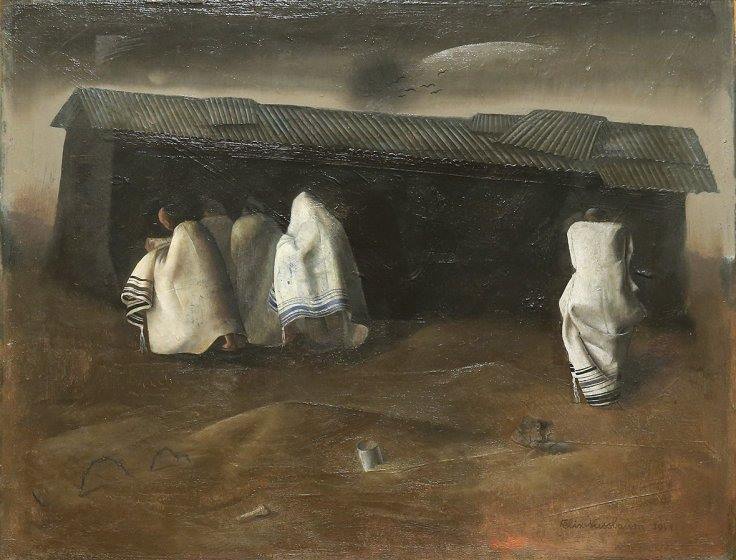
Camp Synagogue In Saint-Cyprien, painted by Felix Nussbaum in Brussels in 1941
That is no small achievement. The world’s greatest civilisations have all, in time, become extinct while Judaism has always survived. In one sense that was surely Divine Providence. But in another it was the foresight of people like Rabban Yochanan ben Zakkai who resisted cognitive breakdown, created solutions today for the problems of tomorrow, who did not seek refuge in the irrational, and who quietly built the Jewish future.
Surely there is a lesson here for the Jewish people today: Plan generations ahead. Think at least 25 years into the future. Contemplate worst-case scenarios. Ask what we would do, if… What saved the Jewish people was their ability, despite their deep and abiding faith, never to let go of rational thought, and despite their loyalty to the past, to keep planning for the future.
Throughout the dark night of history, Esav's descendants sacrifice Yaakov in their furnaces; only at the dawn of redemption, the rebirth of the State of Israel, is meaning seen in the sacrifices, the burnt offerings, of Jews on their altars-- though Israeli soldiers are also killed, we can see for what they're dying. Eventually peace will come to a "free people in their land"-- but that is not enough. The raison d'etre of Israel is for the eternal light of Eden to go forth to the whole world from Jerusalem, to be "a holy people" in our land AND that our people around the world embrace and be strengthened by her truth.
FOOD FOR THOUGHT
- Other than not engaging in human sacrifice, what are some reasons why the Jews survive when other civilizations have disappeared?
- Which “substitute for sacrifice” is the most meaningful to you, or how do you plan on incorporating one (or more) into your life?
Recommended for you:
#SHABBAT TALKS
Bring a touch of Israel into your Shabbat (or any time you are up for a friendly debate!) with these great discussion resources
About the Author
